The Despised Richard Steele, C. F. Buser,
William F. Pickard, D. W. Pye
Fair Deal for the Clergy Sir Alfred C. Bossom, MP Refereeing Rugger Daphne Fanwood Government by Old Etonian R. W. Wood,
Prof J. G. Bullocke
Place Names Jocelyn Brooke, Michael Rix Speeches and Clichés Michael Hornby The Sterling Area Daniel Macmillan The Horse's Mouth Patric Dickinson Build It Yourself Paul Jennings An Eruption of Turquoise Violet R. Ormerod Polite Politics R. H. Stevenson
THE DESPISED
SIR,—As a soldier in the last war, I spent a con- siderable period of time in Egypt, some of it in the desert, some in Cairo and Alexandria, and a fair bit of time at Suez and at the edge of the Canal itself. During the years I was there I met Egyptians in practically every walk of life and had the oppor- tunity of gaining a first-hand knowledge of the Egyptian character, and have reluctantly been forced to the realisation that over the decades we have steadily and consistently bred in these people a contempt for our, white civilisation that would lead any nation to, turn on us as the Egyptians have done over the Suez Canal.
Why have we, the white race which has come so far, such a poverty-stricken mentality when it comes to dealing with a race of another colour? It seems to make little difference how intelligent or unintel- ligent the coloured race is, or what their standard of living is or how they respond to ordinary courtesy, it seems imperative that we give any coloured race, in whatever country we have been, every reason to rid themselves of us and be glad when we are gone.
From my observations in Egypt I feel strongly that we could never make amends for our studied pro- gramme of arrogance towards that race and that if we ever fight a major war against this nation that we have wronged so consistently we would only do so because we are so blind to our failings. I do not believe that Nasser or any other strong man could have aroused the Egyptians and Arabs against us if we had displayed in our occupation of Egypt even the most common of courtesies and brotherly be- haviour which we so firmly believe are part and parcel of the make-up of the average man who is a product of our so-called cultured civilisation.
Why was our attitude towards the Egyptians never given mention during or after our occupation there? Because the vast majority of whites who were stationed there have taken the Anglo-Saxon attitude towards the Egyptian as being a perfectly normal atti- tude. Ask almost any soldier, sailor or airman what impressions be had of the people of that country and the reply invariably will be that they are a `bunch of Wogs, dirty and full of thievery.' He will consider any feeling of incompatibility leading to arrogance to be perfectly justified, and has no hestitation in showing acute dislike for the Egyptian or Arab, particularly those in the lower brackets of life.
When this same soldier, sailor or airman returns to his native land, however, don't expect him to maintain that belligerent attitude towards his fellow human who, in his own country, is dirty enough and Poverty-stricken enough to be the counterpart of the native he was quite willing to abuse in Egypt. Our returned Service man never makes even a subdued peep about dirty people in his home city, even though there may be thousands, but it is brought up time and time again in the Middle East as a reason why the Arab is not `acceptable.'
Mr. average Egyptian businessman, with a family and apartment in Cairo or Alexandria, is generally as clean as—or cleaner than—we are. He dresses very well, his food is excellent and beautifully served, his home spotless. These are facts that most of us who have been there choose to ignore.
Thievery?—a man who will pay off a taxi in his home town and give the driver a 250 tip and thank him undergoes a radical change of mind in Egypt. He Swill hire a taxi, load in four or five friends and maybe run out eight, or ten miles to his camp or base. The fare will be somewhat less than half what a relative trip would cost back home. Does that please our Service man? Not at any price! He and his friends gang up on the driver and abuse him in the foulest English and Arabic. In some cases they beat up the driver, regardless of his age. In the spring of 1942 in Cairo the taxi drivers went on strike and would not pick up a soldier to go anywhere at any price. Many camps put a police-supervised taxi pay- out station at the camp gate and it improved our taxi manners considerably.
I fought with some of the finest troops in the world in the Western Desert—the Second New Zealand Expeditionary Force. A soldier could not wish to be in better company in battle. On leave in the cities of the Middle East they were rabid troublemakers. The Egyptians live in the cities.—Yours faithfully,
Kelowna, BC, Canada RICHARD STEELE


































 Previous page
Previous page